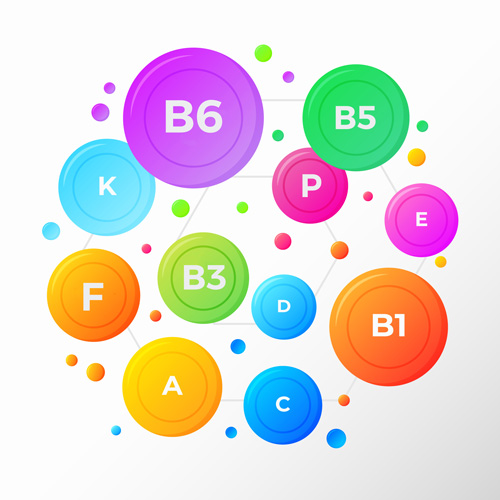Vitamins

Vitamin A (retinol, retinal, retinoic acid and provitamin A carotenoids): Keeps skin healthy & clear, combats infection and reduces signs of aging.
Vitamins B1 (Thiamine) & B2 (Riboflavin): Support cellular energy production (essential for glucose metabolism) and enhance activity of other B vitamins.
Vitamin B3 (Niacinamide): It increases epidermal production of ceramides (and increases hydration) and also skin barrier layer proteins and their precursors (keratin, involucrin, filaggrin) leading to improved barrier function and pore reduction preventing PM (Particulate Matter) from absorbing through the epidermis. It stimulates production of collagen and fibroblasts for elastic and supple skin, and reduces hyperpigmentation. Also, it is a proven anti-inflammatory and has anti-oxidant capabilities.
Vitamin B5 (Pantothenic acid): Required to synthesize and metabolize proteins, carbohydrates, and fats. It is a precursor for biosynthesis of Coenzyme A (CoA) an essential cofactor involved in a myriad of metabolic reactions that include synthesis of phospholipids. Vitamin B5 stimulates cellular proliferation and helps tissue repair. Protects skin against sunburn and aids hydration. It offers long lasting moisturisation and soothes irritated skin. It helps to improve the barrier function of skin and promotes healing.
Vitamin B6 (Pyridoxine): Serves as a coenzyme in many enzyme reactions in amino acid, glucose and lipid metabolism. It has wide-ranging physiological functions but particularly known for anti-inflammatory properties.

Vitamin C (Ascorbic acid) : There are many derivative of Vitamin C used in skincare products. There is always a trade-off between its stability and antioxidant efficacy. It is a potent antioxidant & brightener with proven ability to stimulate collagen production. It has skin firming properties due to fibroblast generation which also reduces skin permeability. The primary structure of collagen consists of three protein strands (that wind together in a triple helix). The three amino acids that make up collagen are glycine, proline, and hydroxyproline. Vitamin C is important in the structure of collagen because the amino acid hyroxyproline cannot be created without the oxygen from Vitamin C. Major Vitamin C deficiency results in scurvy where there is a lack of collagen in the body. It chelates heavy metals to prevent absorption through skin pores.
Vitamin D: It is easily absorbed and has a key role in cell metabolism and turnover, used as keratinisation regulator to improve skin texture and smoothness.
Vitamin E (Natural Mixed Tocopherols): It is an antioxidant combating free-radical damage. Provides Excellent moisturising properties.
Vitamin F: It is a combination of 2 essential fatty acids, linoleic acid and linolenic acid, that nourish and repair skin to enhance suppleness.
Vitamin K (Phylloquinone): It evens skin tone and reduces discolouration and dark circles by strengthening damaged and broken capillaries.
Vitamin P: It is a bioflavonoid that strengthens and reduces permeability of capillary walls, aids circulation and enhances efficacy of Vitamin C.
